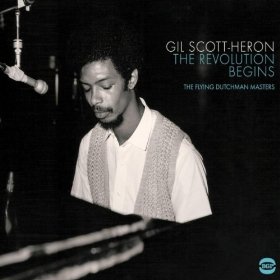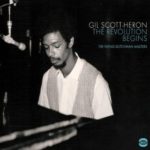
Ace Records
“Give ‘em flowers while they can still smell them,” someone told me a long time ago – and in a perfect world, that’s the way it would go. People would be recognized for their talent, contributions, and/or influence while they were still here to receive their accolades.
But as Gil Scott-Heron dedicated his life to pointing out, we live in a world that’s far from perfect. Scott-Heron, who passed away in May of 2011, cannot smell the flowers offered him now – but his work can still be (and deserves to be) celebrated. And The Revolution Begins: The Flying Dutchman Remasters does a fine job of spotlighting Scott-Heron’s early recordings on the Flying Dutchman label.
Compiled by Ace Records’ Dean Rudland, The Revolution Begins gathers material from Scott-Heron’s first three albums – Small Talk At 125th And Lenox, Pieces Of A Man, and Free Will – along with a one-track collaboration with drummer Pretty Purdie’s band The Playboys, all recorded between late summer of 1970 and early 1972. Rudland’s presentation is a good one: the first disc of the 3-CD collection is labeled “Songs” and not only showcases Scott-Heron classics such as the soulful “Did You Hear What They Said?”, the funky “When You Are Who You Are”, and the upbeat tribute “Lady Day And John Coltrane” but the talents of some great collaborators, as well. Brian Jackson’s piano and backing vocals were key parts of Scott-Heron’s work at this point; Ron Carter lends his amazing bass sound to a number of tracks; and Hubert Laws’ flute and sax are often the perfect punctuation to Scott-Heron’s words.
“Poetry, Jazz & The Blues” is the title of Disc Two: the performances are bare-bones musically (often just some cool hand percussion) but heavy in message. There’s nothing pretty about the truth of “Billie Green Is Dead”, the homophobia of “The Subject Was Faggots”, or the finger-pointing (at Nixon’s right-hand man John Mitchell) of “No Knock” – but the ugliness they toe up out of life’s dirt is still just as real 40-plus years later.
Disc Three is comprised of alternate tracks from the Free Will album, but the material is far more than archival curios. Compare versions of “The Middle Of Your Day”, “Wiggy”, or “The Get Out Of The Ghetto Blues” to the takes originally released and you realize just how unique each and every one of Scott-Heron’s performances were. These weren’t recitations – they were statements; messages; right-now deliveries fueled by the emotions of the day, the hour, the moment. In short, you’ll find no filler on The Revolution Begins – everything counts.
Gil Scott-Heron has been gone now for two years; at least we can keep his work alive by playing it – and, most importantly, listening to it. As mentioned earlier, the truth is never dated.
There really are no other flowers to give.
*****
Brian Robbins smells the flowers over at www.brian-robbins.com



No Comments comments associated with this post